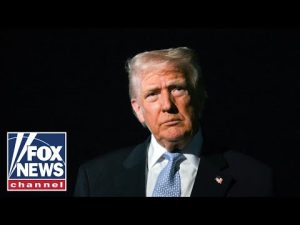In a world where battles often play out in political arenas and diplomatic offices, it’s pretty refreshing to see the Trump administration flexing its muscle in a more traditional way. The commander-in-chief has put Venezuela, and specifically its controversial leader, Nicolás Maduro, on high alert with the launch of Operation Southern Spear. This bold military maneuver seeks to tackle narco-terrorism by deploying a quarter of the U.S. Navy’s warships to the Caribbean, proving yet again that America knows how to make an entrance.
The mighty USS Gerald Ford, the Navy’s newest and largest warship, has joined forces with a formidable fleet including guided missile destroyers and B52 bombers. It’s hard to mistake this as anything but a strong message directed at Maduro’s regime, which has allowed drug smuggling to flourish in the region. A series of strikes against suspected drug-smuggling vessels underscore the administration’s commitment to curbing this illicit trade. But let’s not kid ourselves—this show of force isn’t just about drugs.
President Trump and his team have sent the message loud and clear: stop the flow of narcotics or face the consequences. This could be seen as a diplomatic pressure cooker—turn up the heat on Maduro until something gives. The real question is whether this immense effort will prod Maduro to make a graceful exit. History teaches us caution when predicting political outcomes, especially where strongmen like Maduro are concerned. Yet, one can only hope that this pressure encourages internal forces loyal to democracy to step up.
But let’s cut to the chase. It’s not just about intimidating Maduro; it’s about sending a broader message to his international patrons in Moscow, Beijing, and Havana. While Venezuela’s military might be outclassed by the U.S., it’s backed by these age-old agitators. Any push for regime change could stir a hornet’s nest, bringing more struggle than a simple game of Risk suggests. Intervention isn’t just about military might; it’s about playing 4D chess on a global scale.
Meanwhile, amidst the clashes of foreign policy and strategy, President Trump is also poised to meet with the Saudi Crown Prince. There’s talk of Saudi Arabia possibly joining the Abraham Accords, a significant step toward Middle Eastern stability. The U.S. seems eager to keep military and economic ties with the Saudis tight, especially when it comes to weapon sales. After all, nobody wants to see the Saudis shopping for military gear from our strategic rivals.
All in all, it’s a potent mix of maneuvers both diplomatically and militarily, reminding everyone that America’s reach and resolve remain impressive. Whether in Caracas or Riyadh, the world will be watching to see how these bold moves play out on the global stage. Here’s hoping the results align with America’s interests, because, let’s face it, the popcorn is already in the microwave.







